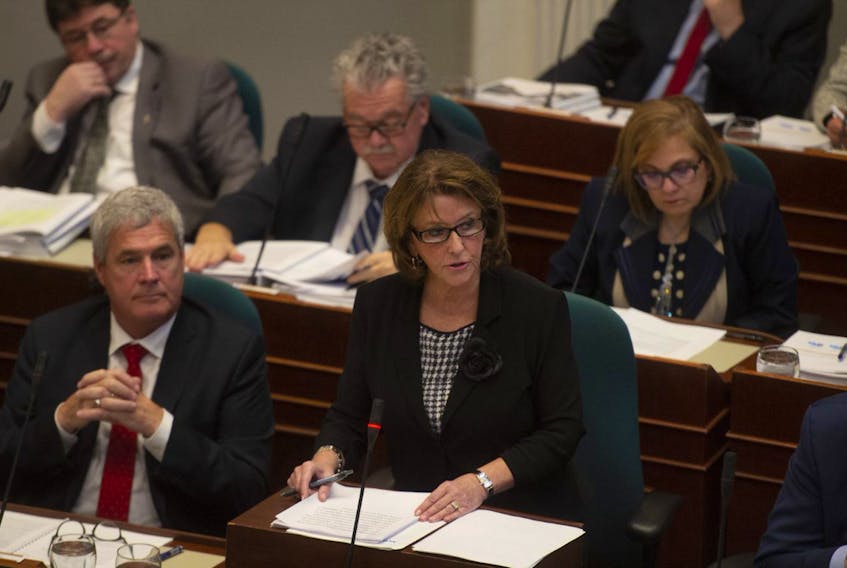Nova Scotia’s Finance Minister Karen Casey says the message of her 2020-21 budget is hope, gratitude and optimism. And if you look, you’ll find all three.
The government is optimistic that, after the provincial economy slows this year to a growth rate of just 0.4 per cent, it will pick up again next year, although it won’t get back to the 2019 level of 1.9-per-cent growth. The province expects the economy to grow by 1.2 per cent in 2021.
The minister’s budget – titled ‘Better Together’ – extends gratitude to individuals, businesses and community organizations for their contributions to the province, but she might have included an appreciative nod to the federal government, as well.
Federal transfer payments to the province, year over year, grew by about 11 per cent or almost $400 million, which pretty much covers the province’s increased operating costs next year.
And the Liberals hope this budget spreads enough money in the right places to yield a decent crop of happy voters who, it seems, they’ll need later this year.
While the biggest chunk of new spending – a billion dollars in capital expenditures – was announced a week ago, the operating budget unveiled Tuesday includes spending that gives the Liberals answers to some questions that have vexed them in recent months and years.
“No child should live in poverty,” Casey said, and her budget added $18 million to extend the Nova Scotia Child Benefit to an additional 6,000 families with 10,000 children. Families with incomes of up to $34,000 now qualify for the benefit. The ceiling had been $26,000.
“The quality of life for Nova Scotians greatly depends on access to safe and affordable housing,” she said. The budget earmarks about $25 million for affordable housing programs, rent supplements and a plan to address homelessness.
“All Nova Scotians deserve the opportunity to thrive and reach their full potential,” said the minister, after announcing $16.6 million in additional funding for the Disabilities Support Program.
Of that, $7.4 million will help Nova Scotians move out of institutional care and into the community. Another $2.8 million will help support people with disabilities who live at home with their families.
The government has been criticized for the high levels of child poverty since figures released about a year ago showed Nova Scotia is the only province where child poverty has increased since the introduction of the Canada Child Benefit in 2016.
The Liberals have also taken flak for their failure to adequately respond to the growing housing crisis – acute in the Halifax Regional Municipality but felt across the province.
And last year, four Nova Scotians successfully won a human rights case against the province for housing them in institutions when they were ready and able to live in community-based alternatives.
The modest measures in the budget won’t silence critics of the government’s record on any of those issues, but they will arm Liberals with talking points to respond to the criticism.

A political document
While this was the fifth successive balanced budget introduced by Stephen McNeil’s Liberals, it also marks the first year the province’s fiscal picture deteriorated since the Liberals were elected in 2013. A billion dollars in capital spending will do that.
The One Nova Scotia commission cited debt-to-GDP ratio as the best measure of overall fiscal health and recommended that the province set a goal of 30 per cent – that is, the debt should be no more than 30 per cent of provincial GDP.
The Liberal government had reduced the ratio steadily, from 38.1 per cent in the 2013-14 fiscal year down to 33 per cent this year. But debt-to-GDP begins to climb again in 2020-21, and the government’s four-year plan has it continuing to climb – albeit modestly – to 2023-24 when it is forecast to be 34.5 per cent.
The political risk in increasing the province’s debt-to-GDP ratio is negligible and more than offset by the benefits that should accrue to the government from a $1-billion capital expenditure, a good portion of which will be spent to put Nova Scotians to work building and upgrading roads, schools, hospitals and other public structures.
But the Liberals pin their political hopes mostly on the provincial economy and, even accounting for the closure of Northern Pulp and the disruption of the entire forestry sector, they believe they have a good economic story to tell. Employment, exports and the province’s population have all grown since 2013.
Like every budget, this one is a political document. It papers over some of the cracks in the Liberals’ political defences and it balances the budget, keeping their claim to sound fiscal management intact, even while providing them with a massive pot of capital spending to grease the electoral machinery.









